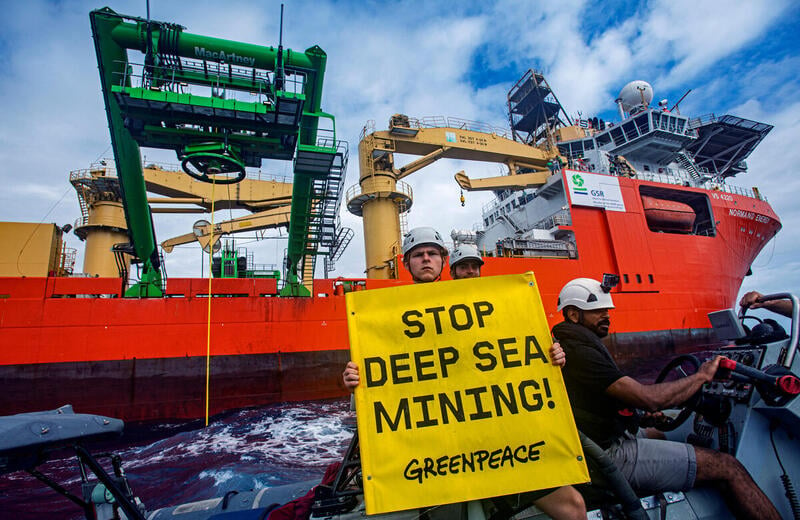Washington, DC (September 12, 2022)–Deep sea mining could begin in the Pacific as early as this month after a shock decision from regulators to allow The Metals Company (TMC) to start mining the seafloor.
The International Seabed Authority (ISA) has granted permission to Nauru Oceans Resources Incorporated (NORI) to begin exploratory mining in the Clarion Clipperton Zone between Hawai’i and Mexico. NORI is a subsidiary of TMC. The initial mining test phase is scheduled to conclude by the end of the year, paving the way for “NORI’s application to the ISA for an exploitation contract” as expressed by TMC itself.
Greenpeace USA project lead on deep sea mining, Arlo Hemphill, said: “This is a troubling development which brings us even closer to the launch of the commercial deep sea mining industry. It is a threat to the ocean, home to over 90% of life on earth, and one of our greatest allies in the fight against climate change. Despite TMC’s repeated callous and erroneous dismissal of the impact the deep sea mining industry would likely have on people and the planet, many scientists have warned that it could result in an irreversible loss of biodiversity and could threaten other benefits to humanity, including critical carbon sinks, future medicine, and international fisheries for tuna and other species.”
Recent reporting from the New York Times shows that TMC, one of the most ardent proponents of deep-sea mining, and its predecessors cultivated a 15-year-long relationship with the ISA, which it has levied to gain a competitive edge in its mining ambitions. This includes preferential access to information that allowed it to gain control over some of the most valuable seabed tracts for future mining. They also reportedly had unprecedented access to international delegates as they debated agenda items, including the firm’s request for the authority to sign off on a plan to test mining equipment. The ISA’s latest authorization to NORI for exploratory mining is the very concrete and dramatic result of TMC’s lobbying efforts and ISA’s complacency.
The cronyism between the ISA and TMC raises serious questions about the ability of that body to execute its mandate of managing ocean resources for the benefit of all humankind.
Hemphill continued: “The ISA was set up by the United Nations with the purpose of regulating the international seabed, with a mandate to protect it. Instead, they are now enabling mining of the critically important international seafloor. The ISA has allocated roughly 200,000 square miles of seabed — larger than the size of California — to developing nations to do exploratory work in the reserved areas, with nearly half of that space now under the effective control of TMC.”
ISA’s Legal and Technical Commission, which approved this mining pilot, includes persons working for mining contractors and meets entirely behind closed doors, allowing no room for civil society to hold them to account. The ISA has regularly faced criticisms of a lack of transparency, accountability, and inclusivity and for its close relationship with prospective deep sea mining companies.
Greenpeace Aotearoa seabed mining campaigner, James Hita, said: “This latest decision from the ISA will have come as a shock to civil society who were shut out of the decision-making process, highlighting a lack of transparency from the authority. For decades, Pacific peoples have been pushed aside and excluded from decision-making processes in their own territories. Deep sea mining is yet another example of colonial forces exploiting Pacific land and seas without regard to people’s way of life, food sources, and spiritual connection to the ocean.
“Right now people across the Pacific are taking a stand, calling for a halt to deep sea mining. Civil society, environmentalists, and a growing alliance of Pacific nations are urging government leaders to stand on the right side of history and stop deep sea mining in its tracks. We must stand in solidarity with our Pacific neighbors and put a lid on this destructive industry to preserve ocean health for future generations.”
Greenpeace is urging world leaders to step in and, at the very least, put in place a moratorium on deep sea mining to protect the ocean.
###
Contact: Tanya Brooks, Greenpeace USA Senior Communications Specialist, P: 703-342-9226, E: [email protected]
Greenpeace USA is part of a global network of independent campaigning organizations that use peaceful protest and creative communication to expose global environmental problems and promote solutions that are essential to a green and peaceful future. Greenpeace USA is committed to transforming the country’s unjust social, environmental, and economic systems from the ground up to address the climate crisis, advance racial justice, and build an economy that puts people first. Learn more at www.greenpeace.org/usa.


